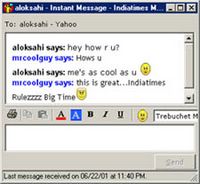ASL PLZ

...Anyone who has used a chat room has noticed the abundance of acronyms. BBL, BRB, IMHO, J/K, OMG, TTYL, LOL—the list is endless. Diehard linguists are having multiple orgasms over the new vernacular that has come about from instant messaging, online chatting, and text messaging, while others have yet to find the new “language” as fascinating. For some of us, the extensive use of abbreviations and shortened words is nothing more than a sign of laziness.
...Have you ever found yourself discussing something important or engaging with someone only to be interrupted by someone named “mido_egypt_i_love_you” who has decided to send you an instant message of “ASL PLZ”? It happens to me every time that I turn on my instant message program. (Not always from Mido, mind you. Sometimes his friends Amir and Hassan have sent me similar messages, to which I firmly reply, “CNN,” “IRS,” “FBI,” or “CIA.”)
...The new “language” of instant messaging isn’t exclusively used by foreigners, though. It’s become quite popular among people who have found typing full words to be too much physical exertion. Pressing those heavy plastic keys on the keyboard must put far too much stress on the fingers. Either that or the typist is simply too lazy to make the effort to actually type.
...Here is where the concern begins for those of us who are quite anal when it comes to writing and speaking. Is instant message slang something that just comes with the territory of Internet chatting, or is it an outlet that helps to facilitate the destruction of a language? Is it increasing the odds of poor grammar and spelling, or should it not matter because those who are using such “words” wouldn’t be writing anything anyway, if it were not for Internet chatting?
...There’s no doubt that a language doesn’t have an ending point, so the argument can be made that language as a concept is always evolving and changing. This, perhaps, allows us to rephrase the question.
...Is the incessant use of such slang and abbreviations a good thing?
...National Public Radio reported that linguistics professor David Crystal views the use of this slang as a way to “extend the range of the language” as well as the “expressiveness” and “richness” of the language. Last year the Christian Science Monitor reported that Al Filreis, director of the Center for Programs in Contemporary Writing at the University of Pennsylvania, saw writing quality go up in the last 20 years because kids are writing more.
...It might be a good thing for linguists and analysts at some level, but I find it hard to believe that teenagers are concerned with range extension, expressiveness, or richness when we see them replace the words “are” with “r,” “you” with “u,” or the ever-popular “cool” with “kewl” on school work or even tests. It seems more like the path of least resistance, doesn’t it?
...These informalities aren’t going unnoticed by other educators at the college level. English professor John Briggs of the University of California remarked, “Americans have always been informal, but now the informality of pre-college culture is so ubiquitous that many students have no practice in using language in any formal setting at all.”
...On one hand, I’m finding it difficult to say that the widespread use of non-existent “words” is a good thing—it looks more like sloth than range extension. On the other hand, maybe I’ll just join in the fun. My concluding paragraph for this post will be nothing but abbreviations, whereby I, too, can play my part in the growth of the modern English language.
...TLOALI. ASDIF. ASODIFJ. OILOHI. ZQOIH. OIHOS. LOL!!! OKN. OMG! OIHOI. OIHOLQGH. WTF?!! TTIPPE. DAT B KEWL YO! TTYL.
Sources: NPR, Christian Science Monitor


0 Comments:
Post a Comment
<< Home